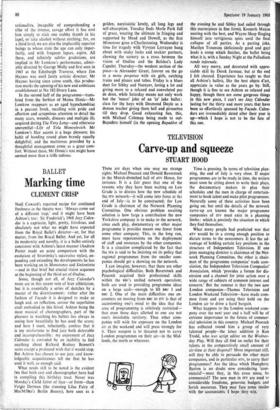Carve-up and squeeze
TELEVISION STUART HOOD
These are days when one may see strange sights. Michael Peacock and Donald Baverstock in the Muzak-drenched hall of ATV House, for instance. It is a fair guess that one of the reasons why they have been waiting on Lew Grade is to discuss how the new schedule of the rry network—it will come into force at the end of July—is to be constructed; for Lew Grade is chairman of the Network Planning Committee. One obvious problem awaiting solution is how large a contribution the tiew Yorkshire company is to make to the network, since each play, documentary or other major programme it provides means one fewer from some other company. This, in the long run, must have repercussions on the deployment of staff and resources by the other companies. It is a situation complicated by the fact that the rrA is said to be insisting on its policy that regional programmes from the smaller com- panies should get a showing on the network.
I can imagine, however, that there are other psychological difficulties. Both Baverstock and Peacock acquired their professional skills within the arc's unified network operation; both are used to providing programme ideas on a large scale—enough to fill Bac 1 and BBC 2. One of the main difficulties one en- counters on moving from BBC to rry is that of accustoming one's mind to the idea that the area of programming is relatively restricted— that even those days allotted to one are not one's inviolable territory. Thus other com- panies will wish for exposure on the London air at the weekend and will press strongly for it. Their weapon is to threaten not to carry London programmes on their air—in the Mid- lands, the north or wherever. Time is pressing. In terms of television plan- ning, the end of July is very close. If major programmes are to be ready in time, the writers must soon be sitting down to write their plays, the documentary makers to plan their schedules and the men in charge of entertain- ment to book talent and make pilot programmes. Naturally some of these activities have been going on; but until the details of the network carve-up are known the major programme companies of rry must exist in a planning limbo : which is precisely the situation in which they find themselves.
What many people had predicted was that ATV would be in a strong enough position to dictate terms to the newcomers. It has the ad- vantage of holding certain key positions in the structure of Independent Television. If one joint managing director is chairman of the Net- work Planning Committee, the other is chair- man of the programme companies' trade asso- ciation, the Independent Television Companies' Association, which 'provides a forum for dis- cussion and a channel for joint action over a wide range of subjects of common interest and concern.' But the rumour is that the two new London companies—Thames Television and London Weekend Television—have made com- mon front and are using their hold on the London air to drive a hard bargain.
What happens to the London weekend com- pany over the next year and a half will be of extreme importance to the future of commer- cial television in this country. Michael Peacock has collected round him a group of very talented people—the latest addition is Ken Trodd, who was script editor on the Wednes- day Play. Will they all find an outlet for their talents in the comparatively small amount of air-time at their disposal? More important still, will they be able to persuade the other main companies, and in particular ATV, to carry their programmes? Are the ideas which Humphrey Burton is no doubt now considering 'com- mercial'—must they, in this crass sense, be commercial? The new men in rry are used to Considerable freedoms, generous budgets and lavish resources. They may face some tussles with the accountants. I hope they win. -


































 Previous page
Previous page